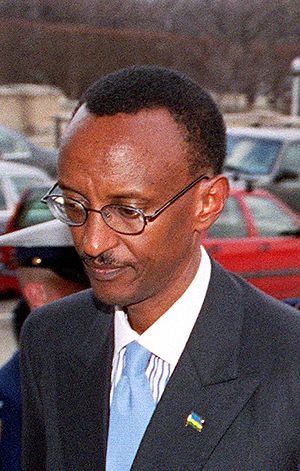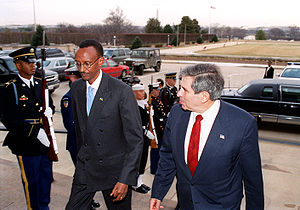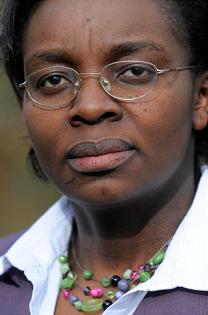He said that he is a target of the Rwandan government and has even received threats while on lecture tours in the U.S.
Prof. Erlinder charges the current Paul Kahame regime of Rwanda of targeted assassinations of those who were accusing the Rwandan leader of genocide - 1990 through 1994 - in which one million people were killed. He and others who have given a long list of victims in many worldwide cities attributed those assassinations to the current Rwandan leadership of Paul Kagame.
One of the mysterious deaths known to the Asian Tribune network was a UN professional who worked to unearth the evidence of the Rwandan genocide – a Sri Lankan Shyamlal Rajapaksa who happened to be a first cousin of the present president of Sri Lanka Mahinda Rajapaksa. His killing in August 2009 in the Tanzanian city of Arusha where the International Criminal Tribunal for Rwanda (ICTR) was headquartered is still a mystery.
Professor Peter Erlinder has come out with an array of evidence and interpretations of the direct culpability of the current Rwandan president Paul Kagame in the Rwandan genocide, how he and his colleagues were given military training in the U.S., how Kagame as the head of the Rwandan Patriotic Front (RPF), a proxy force of the Pentagon according to Erlinder, invaded Rwanda to unleash a genocide with tacit approval of the United States, and in the following years how the United States took covert and overt steps to cover up its involvement in the Rwandan mass massacre.
It is here that Ambassador-at Large Stephen Rapp’s name emerge. Mr. Rapp is currently the head of the Office of War Crimes Issues of the U.S. Department of State, and in his previous position as the chief prosecutor of the Rwandan genocide, according to Peter Elinder, and many other investigators, Mr. Rapp was one of the main who was involved in the cover up of US involvement in the Rwandan Genocide.
The Asian Tribune readers may recall that Stephen Rapp in his capacity as the State Department’s War Crimes Issues chief who prepared and released a document in October 2009 with ambiguous evidence which accused Sri Lanka of violating international humanitarian laws during the final (Jan-May 2009) stage of the battle with separatist/terrorist Tamil Tigers (LTTE).
In October 1990, the Ugandan army and the Rwandan Patriotic Front/Army (RPF) led by Major General Paul Kagame invaded Rwanda. The guerrillas who violated international laws and committed massive war crimes were backed by Britain, Belgium, the United States and Israel, according to many investigators and researchers. By July 1994, the RPF completed its coup d'etat and consolidated its power in Rwanda.
On April 6, 1994, the governments of Rwanda and Burundi were decapitated when the plane carrying the two presidents and top military staff was shot down over Kigali, Rwanda's capital. The well-planned assassinations of Juvenal Habyarimana and Cyprien Ntaryamira sparked a massive escalation of warfare that is falsely portrayed as the result of meaningless tribal savagery. These assassinations were major war crimes, and the RPF and UPDF were responsible, but almost every attempt to honestly investigate the double presidential assassinations has been blocked by the U.S. and its allies.
A frequent contributor to a think tank called Global Research, Prof. Elinder outlined the United States endeavor in the cover up of its own culpability in the Rwandan genocide.
He wrote: “The July 9, 2009 New York Times reported that the Obama administration had selected Stephen Rapp to replace the Bush administration Ambassador-at-Large for War Crimes, Pierre Prosper. Rapp began his international career at the UN Security Council Criminal Tribunal for Rwanda in 2001, while Carla Del Ponte was Chief Rwanda Prosecutor. Rapp’s nomination just a few months after Del Ponte’s of her memoir of her years as Chief UN Prosecutor, Madam Prosecutor: Confronting Humanity’s Worst Criminals and the Culture of Impunity was published in English.
“Del Ponte’s book describes in detail the systematic U.S.-initiated cover-up of crimes by the current Rwandan government, a U.S. ally, committed during the Rwanda Genocide, and how she was removed from her ICTR (International Criminal Tribunal for Rwanda) position in 2003 by U.S. Ambassador Prosper, himself, when she refused to cooperate with the U.S.-initiated “cover-up.”
According to Del Ponte, her ICTR Office had the evidence to prosecute Kagame for “touching-off” the Rwanda Genocide by ordering the assassination of Rwanda’s former President Juvenal, Habyarimana, long before 2003. She also details the dozens of massacre sites, involving thousands of victims, for which the current Rwandan President, Paul Kagame and his military, should be prosecuted. The well-publicized canard, that “the identity of the assassins of Habyarimana is unknown” is a bald-faced lie, well -known by ICTR Prosecutors, according to Ms. Del Ponte, writes Prof. Elinder in Global Research.
Two years after Del Ponte was removed from office, Stephen Rapp became “Chief” of ICTR Prosecutions with access to all of the evidence known to Ms. Del Ponte, and more that has been made public in the past few years. During his four years at the ICTR, Rapp like Del Ponte, also was in a position to prosecute Kagame and members of the current government of Rwanda but, not ONE member of Kagame’s military has been prosecuted at the ICTR, to date…and the “cover-up” revealed by Del Ponte, continues today. And, unlike, Ms. Del Ponte, who was fired by the U.S., Mr. Rapp was first rewarded with an appointment as Chief Prosecutor at the U.S.-funded Sierra Leone Tribunal and now, a coveted ambassadorship by the Obama administration as the chief of the Office of War Crimes Issues at the State Department.
Mr. Rapp, for reasons known and unknown to the Asian Tribune, used ambiguous and conflicting information and data to accuse Sri Lanka of violating International Humanitarian Laws (IHL) in a report released to the US Congress in October 2009.
Former Chief ICTR Prosecutor Del Ponte Details War Crimes “Cover-up”
According to Del Ponte, in May 2003 she was called to Washington D.C. by Prosper (ironically, also a former ICTR prosecutor with knowledge of Kagame’s crimes) who informed her that the U.S. would remove her UN post, if she carried through with her publicly announced plans to indict Kagame and members of his government and military. According to Del Ponte, when she refused to knuckle-under because “she worked for the UN, - not for the U.S” Prosper told her ICTR career was over. In October Del Ponte was replaced by a US-approved ICTR prosecutor, Hassan Abubacar Jallow, who elevated Rapp to “Chief of Prosecution” two years later.
ICTR Trials: More Evidence of Rwanda Crimes Cover-Up
Del Ponte’s revelations are not the only evidence that a U.S.-initiated “war crimes cover-up” at the ICTR is creating impunity for crimes committed by the Kagame and his military. On September 10, 1994 memo in evidence in the ICTR Military-1 Trial confirms that U.S. Secretary of State Warren Christopher was informed that Kagame’s troops were killing “10,000 civilians a month” in military-style, according to an investigation funded by US Agency for International Development (USAID). And, as early as January 1997, a team made up of Chief ICTR Investigative Prosecutor and former Australian Crown Prosecutor Michael Hourigan; former FBI Agent James Lyons; and former UN-Chief of Military Intelligence in Rwanda, Amadou Deme; reported Louise Arbour, Ms. Del Ponte’s predecessor, that Kagame should be prosecuted for assassinating the previous president. Arbour scuttled the investigation, suppressed the report and disbanded the investigative team.
Shortly, thereafter, Arbour was elevated to Canada’s Supreme Court and has sunsequently been chosen to head the International Crisis Group.
Louise Arbour as the head of the International Crisis Group released a report in May 2010 accusing Sri Lanka of war crimes said: “Evidence gathered by the International Crisis Group suggests that these months saw tens of thousands of Tamil civilian men, women, children and the elderly killed, countless more wounded, and hundreds of thousands deprived of adequate food and medical care, resulting in more deaths. This evidence also provides reasonable grounds to believe the Sri Lankan security forces committed war crimes with top government and military leaders potentially responsible.”
Former ICTR Prosecutor Rapp Complicit in Cover-up
But, even though Arbour suppressed the “Hourigan Report,” Del Ponte, Rapp and other ICTR prosecutors certainly knew about it, because ICTR judges had ordered Del Ponte’s Office to release the “Hourigan report” to a defense team as early as the year 2000, a year before Rapp began his ICTR work, and three years before Del Ponte was fired by Prosper.
Prof. Peter Elinder says “But….to date, not one indictment has been issued against Kagame by the ICTR Prosecutor.”
Consequences of the ICTR Cover-up of Kagame’s Crimes
The tragic consequence of the failure to prosecute Kagame at the ICTR, from 1994 to date, is that Kagame has been free to invade the Congo in 1996 and 1998, and to occupy part of the eastern Congo many-times larger than Rwanda, to this day. No less than four UN Security Council-commissioned Panel of Experts Report(s) on the Illegal Exploitation of the DR Congo (2001, 2002, 2003 and December 2008) have detailed the massive rape of the Congo’s resources that has brought vast riches to Kagame and his inner circle.
While Rapp was ICTR Senior Trial Attorney in 2003, Kagame was effectively elected President-for-Life with 95% of the vote, after banning opposition parties and jailing opponents, in “a climate of intimidation” according to EU observers.
“Chief of Prosecutions” Rapp Withheld Exculpatory Evidence
In February 2009, the ICTR issued its Judgment the Military-1 case, that main case at the ICTR, in which Mr. Rapp personally appeared for the Prosecution. Although massive violence did occur in Rwanda, the court certainly recognized that blaming only one side WAS a falsehood, when it acquitted all of the “architects of the killing machine” (as Mr. Rapp called the defendants in court) of conspiracy or planning to kill civilians. The highest ranking military-officer was acquitted of all charges.
And, although it is now clear from Ms. Del Ponte’s memoirs that Mr. Rapp had the evidence to clear the ICTR defendants of the assassination charges and only the losing side has been blamed for all crimes committed in Rwanda in 1994. Simply put, Mr. Rapp and other ICTR prosecutors have withheld evidence that would be beneficial to the defense, contrary to Tribunal Rules; have prosecuted defendants for crimes they knew were committed by Kagame’s forces; and, have created a system of “judicial impunity” that has permitted Kagame to kill millions in the eastern Congo.
It is in this context that Prof. Peter Elinder writing to Global Security questioned President Obama’s wisdom in appointing Stephen Rapp as the head of the Office of War Crimes Issue at the State Department in this manner: “This “inconvenient-African-truth,” raises an uncomfortable question regarding President Obama’s nomination of Mr. Rapp, in the first place: Are Obama and his advisors ignorant of the public record regarding Rapp’s complicity in the ICTR Cover-up….or do they just not give a damn?”
The U.S. Culpability in Rwanda Genocide
Aimable Mugara in a piece to OpEdNews put it this way: “In 1990, General Kagame who was the Chief of Military Intelligence of Uganda and head of the Rwandan Patriotic Forces (RPF) led a violent invasion of Rwanda from Uganda, with the approval and support (financial, military and political) of the United States government. This violent war changed the landscape of that region forever. By landscape, I also mean the number of mass graves that dot every of inch of that region now. The two final years of President Bush the father, during which his American government supported the murderous gang of General Kagame and Yoweri Museveni resulted in the deaths of many innocent Rwandan and Ugandan civilians. During those two years, there are thousands who lost their lives at the hands of General Kagame's soldiers and Yoweri Museveni's soldiers. But this was nothing compared to the more than 6 millions of civilians that would later die under Bill Clinton's 8 year reign, with American money, American weapons and American political support.”
In a September 30, 2010 New York Times article titled ‘Dispute Over U.N. Report Evokes Rwandan Déjà Vu’, it is mentioned how in the fall of 1994, a United Nations investigation discovered that General Kagame's forces had killed tens of thousand of innocent civilians that year. That under pressure from Bill Clinton's government, the United Nations was forced not to publish that report. In that New York Times article, they talk about how the 1994 UN report describes General Kagame's soldiers "rounding up civilians and methodically killing unarmed men, women and children."
“Kagame received his military education under the Pentagon’s Joint Combined Exchange Training (JCET) at the Command and General Staff College of Fort Leavenworth, Kansas, beginning in 1990,” wrote John E. Peck of the Association of African Scholars (2002). “His sidekick, Lt. Col. Frank Rusagara, got his JCET schooling at the U.S. Naval Academy in Monterey, California. Both were dispatched to Rwanda in time to oversee the RPF’s takeover in 1994. Far from being an innocent bystander, the Washington Post revealed on July 12, 1998 that the United States not only gave Kagame $75 million in military assistance, but also sent Green Berets to train Kagame’s forces (as well as their Ugandan rebel allies) in low intensity conflict (LIC) tactics. Pentagon subcontractor Ronco, masquerading as a de-mining company, also smuggled more weapons to RPF fighters in flagrant violation of UN sanctions. All of this U.S. largesse was put to lethal effect in the ethnic bloodbath that is still going on.”
In 2009 published Edward S. Herman and David Peterson's investigative/research book The Politics of Genocide said: “The United States and its allies worked hard in the early 1990s to weaken the Rwandan government, forcing the abandonment of many of the economic and social gains from the social revolution of 1959, thereby making the Habyarimana government less popular, and helping to reinforce the Tutsi minority’s economic power.9 Eventually, the RPF was able to achieve a legal military presence inside Rwanda, thanks to a series of ceasefires and other agreements. These agreements led to the Arusha Peace Accords of August 1993, pressed upon the Rwandan government by the United States and its allies, called for the “integration” of the armed forces of Rwanda and the RPF, and for a “transitional,” power-sharing government until national elections could be held in 1995.10 These Peace Accords positioned the RPF for its bloody overthrow of a relatively democratic coalition government, and the takeover of the Rwandan state by a minority dictatorship.”
The U.S. State Department’s Office of War Crimes Issues chief Stephen Rapp knew this entire Rwandan episode, the U.S. interests in Paul Kagame, the UN concealment of the 1994 report at the behest of the Clinton administration, the U.S. military assistance to Kagame’s Rwandan Patriotic Front and the entire exercise of the ‘Rwandan cover up’ to conceal the U.S. culpability in the Rwandan genocide when he focused his attention elsewhere; Sri Lanka.
- Asian Tribune -


 Joseph Kabila, son of Laurent Kabila and actual president of the DR Congo.
Joseph Kabila, son of Laurent Kabila and actual president of the DR Congo.











